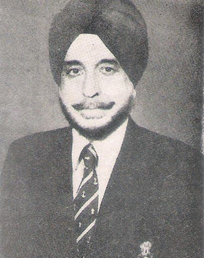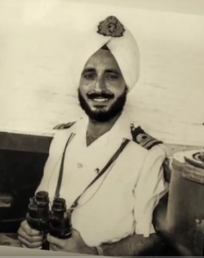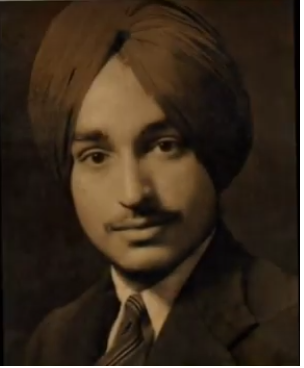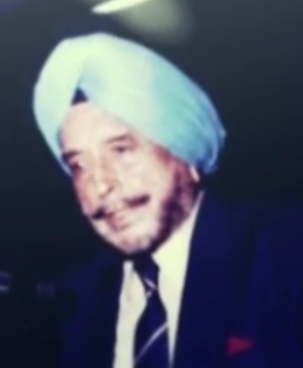



Born in Phabnawa, schooled in Punjab, graduated in Lahore and then completed him MA / LLB in Lucknow. Straight from the campus he joined the Royal Navy during World War II. He served on board ships in the South East Asia Command where he was involved in live action. After the war, he was then sent to England for the Long Gunnery Course. After partition, he was sent in 1949 to JSW, Dehradun as Squadron Commander of the 1st to 4th courses. He was subsequently posted to various ships, CO of INS Kuthar and Squadron Commander of Kirpan, Kuthar and Khukari. He was also actively involved in the Liberation of Goa. 1962 onwards he was posted to various naval establishments, promoted to Capt. in 1964 and then sent as Chairman of the Service selection board, Meerut (1966). After being Director Naval training in Delhi, he went as CO Venduruthy, Cochin. His final posting was Director NCC, Tamil Nadu & Pondicherry. Retired in Jan 1974 after 31 years in uniform. That was just the 1st inning of his career.
In Jan 1975, He joined Great Easter Shipping Co. and founded the first ever private Shipping Company’s ‘Cadet Academy’ at TS Jawahar. He implemented selection and training criterion for the officers, which were used in the defence forces. This is where fresh 18 year olds were inducted and groomed in the “Pre Sea Training” and subsequently “Mid-Sea Training” courses. Primarily for induction into Great Eastern. The academy also selected and trained cadets for various other companies like, Barbers, Wallem, Tradex, Mobile to name a few…
He was very passionate about taking the ‘right’ ‘boys’ for a career in shipping. Marks in schooling were important, but only to an extent, it was the right breed that he was looking for. He was looking for qualities which makes leaders and Captains of ships in general and in the industry at large. Many years later, the academy was recognised as the first training academy in the private sector by the Government of India and put on the ‘white list’. This is where we ‘boys’ were instilled with the values that set the foundations of what we grew up to become. Leadership, discipleship, loyalty, the will to excel, pride in who we are and in our roots, integrity, determination etc. were the building blocks.
GESCO had been gracious enough to let him decide when he wished to retire and appoint his successor. He ended this 2nd innings at the age of 77. His legacy lives on… the academy has since evolved into The Great Eastern Institute of Maritime Studies, Lonavala.
In his old age he spoke fondly of both his innings and took great pride in the young men he had trained. He would visit Singapore, and during some dinners, whenever he heard that so and so had done well or started a company or achieved something, his chest would swell up with pride like a father, and he would go “My Boy, my boy!!”
As a person, he had a great sense of humour, amazing wit, and a very large heart. After his first heart attack in the late 1970’s, he was forced to stay in Room No. 1 of INS Ashwini which had a balcony facing the sea, and that is where he wrote his first set of Poems, whilst gazing through the ocean, which was later published by his sister Sanjiwan in collection called ‘The Lonely Furrow’. He also did a few readings in the Poetry society of India. He had that ability to come up with a joke or an antidote for every occasion and with his sense of humour he could make his wife ‘Jaggi’ blush even at the age of 70.
After his father passed on, he was the head of the Malia family and was highly respected and loved by one and all. He was a very helpful person and would go out of his way to make a call or advise someone.
He always had time to take care of his people. He was also a member of the Department Ex-Serviceman Welfare and assisted in advice in their various activities, such as rehabilitation of War widows etc. Even in his late 80’s, he would troop to Delhi for meetings, stay in his preferred Naval guest House and decline to stay with relatives. His driver’s son was ordered to come home every other Sunday to learn English and values from him. The lad went on to his BSc from Jai Hind collage.
He believed in Discipline. He would be up every morning at 6 am sharp and start his exercises at 6.30 am. Punctuality was another of his hallmarks. He would reach a meeting well before time and then wait in the car or sit outside, and walk in just 1 min before the appointment time. Once a politician had scheduled a meeting at T.S. Jawhar and was 10 mins late. The Commodore told his secretary to say he had waited and then left. The politician, huffing and puffing from his climb of stairs up, just could not believe it.
Always smartly attired, ramrod straight, with a twinkle in his eye, he was graceful, wise, charming and above all, honourable. His word was his bond. An officer and a gentleman!